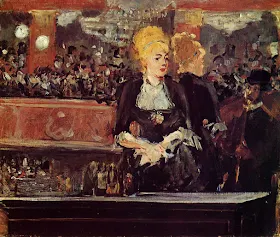Edvard Munch, Tavern in St. Cloud, 1890.
Η
ώρα μια την νύχτα θάτανε,
ή
μιάμισυ.
Σε μια γωνιά του καπηλειού·
πίσω
απ’ το ξύλινο το χώρισμα.
Εκτός
ημών των δυο το μαγαζί όλως διόλου άδειο.
Μια
λάμπα πετρελαίου μόλις το φώτιζε.
Κοιμούντανε,
στην πόρτα, ο αγρυπνισμένος υπηρέτης.
Δεν
θα μας έβλεπε κανείς. Μα κιόλας
είχαμεν
εξαφθεί τόσο πολύ,
που
γίναμε ακατάλληλοι για προφυλάξεις.
Τα
ενδύματα μισοανοίχθηκαν — πολλά δεν ήσαν
γιατί
επύρωνε θείος Ιούλιος μήνας.
Σάρκας
απόλαυσις ανάμεσα
στα
μισοανοιγμένα ενδύματα·
γρήγορο
σάρκας γύμνωμα — που το ίνδαλμά του
είκοσι
έξι χρόνους διάβηκε· και τώρα ήλθε
να
μείνει μες στην ποίησιν αυτή.
Ramón
Casas, Study, circa 1893.
(Από τα Ποιήματα
1897-1933, Ίκαρος 1984)
Comes to Rest
Édouard Manet, Study for "Bar at the
Folies-Bergere", 1882.
It must have been
one o’clock at night
or half past one.
A corner in the
wine-shop
behind the wooden
partition:
except for the two
of us the place completely empty.
An oil lamp barely
gave it light.
The waiter, on duty
all day, was sleeping by the door.
No one could see
us. But anyway,
we were already so
aroused
we’d become
incapable of caution.
Our clothes half
opened—we weren’t wearing much:
a divine July was
ablaze.
Delight of flesh
between
those half-opened
clothes;
quick baring of
flesh—the vision of it
that has crossed
twenty-six years
and comes to rest
now in this poetry.
Egon Schiele, Reclining nude, 1918.
(C.P. Cavafy, Collected
Poems. Translated by Edmund Keeley and Philip Sherrard. Edited by
George Savidis. Revised Edition. Princeton University Press, 1992)




Δεν υπάρχουν σχόλια:
Δημοσίευση σχολίου